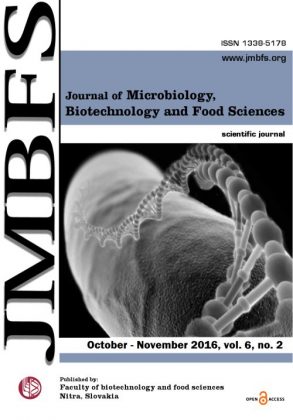GENETIC DIVERSITY ANALYSIS OF CASTOR (RICINUS COMMUNIS L.) USING SSR MARKERS
DOI:
https://doi.org/10.15414/jmbfs.2016.6.2.777-780Keywords:
Castor; Dendrogram; Genetic diversity; Simple sequence repeat (SSR)Abstract
The aim of this study was to assess genetic diversity within the set of 60 ricin genotypes using 5 SSR primers. Ten SSR primers revealed a total of 36 alleles ranging from 5 to 10 alleles per locus with a mean value of 7.20 alleles per locus. The PIC values ranged from 0.758 (Rco30) to 0.879 (Rco29) with an average value of 0.829 and the DI value ranged from 0.774 (Rco30) to 0.881 (Rco29) with an average value of 0.836. Probability of identity (PI) was low ranged from 0.002 (Rco29) to 0.015 (Rco30) with an average of 0.006. A dendrogram was constructed from a genetic distance matrix based on profiles of the 5 SSR loci using the unweighted pair-group method with the arithmetic average (UPGMA). According to analysis, the collection of 60 diverse accessions of castor bean was clustered into five clusters. Cluster 1 contained 14 genotypes, cluster 2 included 7 genotypes of ricin and cluster 3 contained 8 genotypes of ricin. Cluster 4 included 10 genotypes and cluster 5 contained 21 genotypes. We could not distinguish 4 genotypes grouped in cluster 1, RM-103 and RM-104 and genotypes RM-100 and RM-101, which are genetically the closest. Knowledge on the genetic diversity of castor can be used to future breeding programs for increased oil production to meet the ever increasing demand of castor oil for industrial uses as well as for biodiesel production.Downloads
Download data is not yet available.
Downloads
Published
2016-10-03
How to Cite
VivodÃk, M., Balážová, ŽelmÃÂra, & Gálová, Z. (2016). GENETIC DIVERSITY ANALYSIS OF CASTOR (RICINUS COMMUNIS L.) USING SSR MARKERS. Journal of Microbiology, Biotechnology and Food Sciences, 6(2), 777–780. https://doi.org/10.15414/jmbfs.2016.6.2.777-780
Issue
Section
Biotechnology
License
Copyright (c) 2016 Martin VivodÃk, ŽelmÃÂra Balážová, Zdenka Gálová

This work is licensed under a Creative Commons Attribution 4.0 International License.
All papers published in the Journal of Microbiology, Biotechnology and Food Sciences are published under a CC-BY licence (CC-BY 4.0). Published materials can be shared (copy and redistribute the material in any medium or format) and adapted (remix, transform, and build upon the material for any purpose, even commercially) with specifying the author(s).





